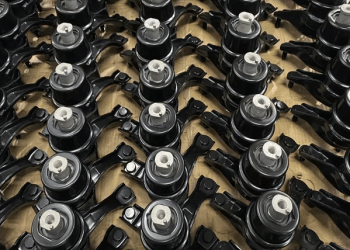Solar batteries play a crucial role in solar panel systems, as they store the excess energy generated by the panels during the day for use during the night or when there is limited sunlight. These batteries are an essential component of off-grid solar systems, allowing users to have a reliable and continuous power supply. In Wollongong, where solar energy is becoming increasingly popular, it is important to understand the basics of solar batteries and how to choose the right one for your needs.
Understanding the Basics of Solar Batteries
Solar batteries, also known as solar energy storage systems, are devices that store the electricity generated by solar panels for later use. They work by converting the DC (direct current) electricity produced by the solar panels into AC (alternating current) electricity that can be used to power household appliances and other electrical devices. Solar batteries are typically connected to the solar panel system through an inverter, which converts the stored DC electricity back into AC electricity when it is needed.
One of the main advantages of solar batteries is that they allow homeowners to become more self-sufficient and reduce their reliance on the grid. By storing excess energy during the day, they can power their homes at night or during periods of low sunlight. This not only helps to reduce electricity bills but also provides a backup power source in case of power outages. However, there are also some disadvantages to consider, such as the initial cost of purchasing and installing a solar battery system, as well as the limited lifespan of the batteries.
Factors to Consider When Choosing a Solar Battery
When choosing residential solar power in Wollongong, there are several factors that you should take into consideration. These include capacity and power rating, battery life and maintenance requirements, compatibility with your solar panel system, cost, and warranty.
Capacity refers to the amount of energy that a battery can store, measured in kilowatt-hours (kWh). The capacity of a solar battery should be chosen based on your energy usage and the amount of excess energy that your solar panels generate. Power rating, on the other hand, refers to the maximum amount of power that a battery can deliver at any given time, measured in kilowatts (kW). It is important to choose a battery with a power rating that is sufficient to meet your peak power demands.
Battery life is another important factor to consider, as it determines how long the battery will last before it needs to be replaced. The lifespan of a solar battery is influenced by several factors, including the type of battery, the depth of discharge (how much of the battery’s capacity is used), and the operating temperature. It is also important to consider the maintenance requirements of the battery, as some types may require regular maintenance or monitoring.
Compatibility with your solar panel system is crucial to ensure optimal performance and efficiency. Not all batteries are compatible with all types of solar panel systems, so it is important to choose a battery that is specifically designed for use with your system. Additionally, consider the cost of the battery and any associated installation costs, as well as the warranty and customer support provided by the manufacturer.
Types of Solar Batteries Available in Wollongong
There are several types of solar batteries available in Wollongong, each with its own advantages and disadvantages. The most common types include lead-acid batteries, lithium-ion batteries, and flow batteries.
Lead-acid batteries are one of the oldest and most widely used types of batteries. They are relatively inexpensive and have a long history of reliable performance. However, they have a limited lifespan and require regular maintenance, such as checking and topping up the electrolyte levels.
Lithium-ion batteries are becoming increasingly popular due to their high energy density, long lifespan, and low maintenance requirements. They are more expensive than lead-acid batteries but offer better performance and efficiency. Lithium-ion batteries also have a higher depth of discharge, meaning that they can be discharged to a greater extent without damaging the battery.
Flow batteries are a newer technology that uses liquid electrolytes stored in external tanks. They offer the advantage of being able to store large amounts of energy and have a long lifespan. However, they are still relatively expensive and have a lower energy density compared to lithium-ion batteries.
When choosing a solar battery, it is important to consider the specific needs and requirements of your solar panel system, as well as your budget and preferences.
Capacity and Power Rating of Solar Batteries
Capacity and power rating are two important factors to consider when choosing a solar battery. Capacity refers to the amount of energy that a battery can store, while power rating refers to the maximum amount of power that a battery can deliver at any given time.
To determine the appropriate capacity for your needs, you should consider your energy usage and the amount of excess energy that your solar panels generate. If you have a high energy usage (such as a Bayswater pasta delivery service) or frequently experience periods of low sunlight, you may need a battery with a larger capacity. On the other hand, if you have a low energy usage or live in an area with abundant sunlight, a smaller capacity may be sufficient.
The power rating of a battery should be chosen based on your peak power demands. This can be determined by looking at the power requirements of your electrical appliances and devices. It is important to choose a battery with a power rating that is sufficient to meet these demands, as using a battery with a lower power rating may result in reduced performance or even damage to the battery.
Battery Life and Maintenance Requirements
The lifespan of a solar battery is an important consideration when choosing a battery for your solar panel system. The lifespan is influenced by several factors, including the type of battery, the depth of discharge, and the operating temperature.
Lead-acid batteries typically have a lifespan of around 5 to 10 years, depending on the type and quality of the battery. They require regular maintenance, such as checking and topping up the electrolyte levels, to ensure optimal performance and longevity.
Lithium-ion batteries have a longer lifespan compared to lead-acid batteries, typically ranging from 10 to 15 years or more. They also have a higher depth of discharge, meaning that they can be discharged to a greater extent without damaging the battery. Lithium-ion batteries generally require less maintenance compared to lead-acid batteries, making them a more convenient option for many homeowners.
To prolong the lifespan of your solar battery, there are several maintenance tips that you can follow. These include keeping the battery at a moderate temperature, avoiding overcharging or over-discharging the battery, and regularly checking and cleaning the battery terminals. It is also important to follow the manufacturer’s guidelines for maintenance and storage.
Compatibility with Your Solar Panel System
Choosing a solar battery that is compatible with your solar panel system is crucial to ensure optimal performance and efficiency. Not all batteries are compatible with all types of solar panel systems, so it is important to choose a battery that is specifically designed for use with your system.
When considering compatibility, you should look at factors such as the voltage and current requirements of your solar panels, as well as the charging and discharging capabilities of the battery. It is also important to consider any additional equipment or accessories that may be required for the battery to work with your system.
To ensure compatibility, it is recommended to consult with a professional solar installer or supplier who can assess your system and recommend the most suitable battery for your needs. They will have the knowledge and expertise to determine which battery will work best with your specific setup.
Cost of Solar Batteries in Wollongong
The cost of solar batteries in Wollongong can vary depending on several factors, including the type and capacity of the battery, as well as any additional equipment or accessories that may be required for installation.
On average, the cost of a solar battery in Wollongong can range from $5,000 to $15,000 or more. Lead-acid batteries are generally the least expensive option, with prices starting at around $5,000 for a basic system. Lithium-ion batteries are more expensive, with prices starting at around $8,000 for a basic system. Flow batteries are the most expensive option, with prices starting at around $10,000 for a basic system.
It is important to consider the long-term savings and benefits of investing in a solar battery, such as reduced electricity bills and increased self-sufficiency. While the upfront cost may be higher compared to traditional grid electricity, the long-term savings can outweigh the initial investment.
Warranty and Customer Support
When choosing a solar battery, it is important to consider the warranty and customer support provided by the manufacturer. A warranty provides protection against defects or malfunctions in the battery and can give you peace of mind knowing that you are covered in case of any issues.
The length and coverage of the warranty can vary depending on the manufacturer and type of battery. It is important to carefully read and understand the terms and conditions of the warranty before making a purchase. Look for a warranty that offers a reasonable length of coverage and includes protection against common issues such as capacity degradation or premature failure.
Customer support is also an important consideration, as it can greatly impact your experience with the battery. Look for a manufacturer that offers responsive and helpful customer support, as well as resources such as user manuals or online forums where you can find answers to common questions or issues.
Installation and Setup of Solar Batteries
The installation and setup of solar batteries should be done by a professional solar installer or electrician who has experience and knowledge in working with solar panel systems. The installation process typically involves several steps, including mounting the battery, connecting it to the solar panel system and inverter, and configuring the settings.
During the installation process, it is important to follow the manufacturer’s guidelines and any local regulations or codes that may apply. This will ensure that the battery is installed safely and correctly, and that it will operate efficiently and effectively.
Proper setup of the battery is also important to ensure optimal performance. This includes configuring the settings such as the charging and discharging parameters, as well as any additional features or functions that may be available. It is recommended to consult with a professional installer or supplier who can guide you through the setup process and ensure that everything is properly configured.
Importance of Professional Assistance in Selecting Solar Batteries
Seeking professional assistance when selecting solar batteries is highly recommended, as it can help ensure that you choose the right battery for your needs and that it is installed and set up correctly.
A professional solar installer or supplier will have the knowledge and expertise to assess your solar panel system and energy needs, and recommend the most suitable battery for your specific requirements. They can also provide guidance on factors such as capacity, power rating, compatibility, and cost.
Additionally, a professional installer or supplier will have access to high-quality products from reputable manufacturers, ensuring that you receive a reliable and durable battery. They can also provide ongoing support and maintenance services to help you get the most out of your solar battery system.
To find a reputable professional in Wollongong, you can ask for recommendations from friends or family who have installed solar panel systems, or search online for local installers or suppliers. Be sure to check their credentials, certifications, and customer reviews before making a decision.
Choosing the right solar battery for your needs is crucial to ensure optimal performance and efficiency of your solar panel system. By understanding the basics of solar batteries, considering factors such as capacity and power rating, battery life and maintenance requirements, compatibility, cost, and warranty, and seeking professional assistance when needed, you can make an informed decision and enjoy the benefits of solar energy storage in Wollongong.






